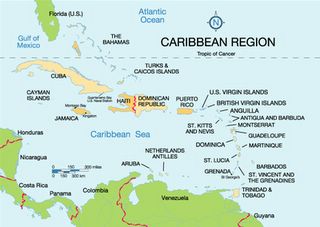KINGSTON, Jamaica—This idyllic region of tropical islands widely known for its reggae music and vacation resorts also faces major development problems of poverty, crime, and education, which are being tackled through an extensive U.S. aid program based here.
Caribbean nations derive their income from tourism, which in Jamaica alone accounts for nearly two-thirds of the gross domestic product (GDP). But the global economic slowdown of recent years and the September 11 terrorist attacks slowed down tourism.
Most Caribbean economies face long-term problems, such as high interest rates, foreign competition, unemployment, and a growing internal debt, the result of government bailouts to ailing economic sectors.
“A major challenge the region faces is the image conveyed by commercials that you see on TV—the white sand beaches, lovely water, and pleasure that people can have here. But the reality is so different,” said Karen Turner, mission director for the Caribbean Regional Program. “Once you go off tourist resorts, the reality of these countries is incredibly different, and sometimes it’s hard for people to grasp that this other world that exists here is actually more the reality.
“Nobody would believe, for instance, that there are people in Kingston that don’t have running water, sanitation facilities, toilets—that they don’t even have latrines, or outhouses,” she added.
With a staff of 95 employees, the mission splits its staff between Jamaica, with 81 employees, and Barbados, with 14.
The mission will spend $14.2 million in Jamaica this year and another $13.6 in neighboring countries. Last year the budget was similar, but complemented by $42.3 million in Grenada, Tobago, and the Bahamas for reconstruction following Hurricane Ivan, which caused severe destruction in September 2004; and $18 million for hurricane recovery in Jamaica.
“The bottom line for the Caribbean region is that there is a real challenge to achieve the kind of economic growth that’s needed—to really maintain prosperity, meet expectations, and to be able to invest in their countries and their people for the future,” said Turner.
FrontLines Acting Deputy Managing Editor Kristina Stefanova visited the Caribbean regional mission recently and wrote this series of articles.


Source: USAID FrontLines








